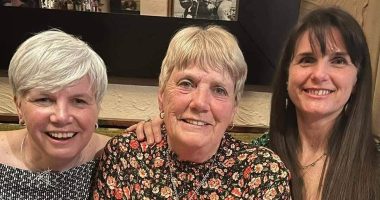Share this @internewscast.com
Experts have warned that a two-word phrase could be a warning sign of dementia. Using these words regularly could indicate serious cognitive decline.
Dementia is a syndrome, or a group of symptoms, associated with the ongoing decline of the brain. Most common in people over the age of 65, it can lead to symptoms such as memory loss, and behavioural and personality changes.
However, it can be hard to know when someone is experiencing normal age-related changes as opposed to dementia. The Alzheimer’s Society explains: “As people get older, they are likely to notice some changes in their mental abilities.
“Though these changes can be frustrating, they are a natural part of ageing. Dementia is not a normal part of getting older.”
While the signs of ageing and dementia may be similar, the latter will be more serious and affect someone’s daily life. The charity continues: “When a person has dementia, this worsening in mental abilities is much more serious.
“For a health professional to diagnose dementia, a person’s symptoms must be significantly affecting their daily life. This means having difficulties with completing daily tasks about the house, in the community or at work.”
Among the symptoms of dementia to look out for are problems with speech and conversation. Experts at the Alzheimer’s Society clarify that “occasionally” struggling to find the right word, but remembering it eventually is something that many older people will experience – and this doesn’t typically mean they have dementia.
Find out about the symptoms you need to watch out for and get health advice with our free health newsletter from the Daily Express
But regularly experiencing this should be cause for concern. More specifically, if someone is frequently referring to objects as “that thing” instead of their correct name it might be time to seek help.
They noted a symptom of dementia could be: “Having frequent problems finding the right word or regularly referring to objects as ‘that thing’”. This is not the only language-based symptom of dementia to look out for.
The society said that “finding it hard to take part in conversations” could be a sign of dementia. However, “needing to concentrate harder to keep up with a conversation, but being able to join in when focused” is a common sign of ageing.
“Regularly being unable to follow what someone is saying even without distractions,” could also signal dementia. But the charity added that “losing track of the conversation if you’re distracted or if many people are speaking at once,” is not something to worry about.
This advice is supported by the NHS, which says that “struggling to follow a conversation or find the right word” is a “common” early sign of dementia. This could appear some time before an official diagnosis is made.
Other early signs, as listed by the NHS, include:
- Memory loss
- Difficulty concentrating
- Finding it hard to carry out familiar daily tasks, such as getting confused over the correct change when shopping
- Being confused about time and place
- Mood changes.
The NHS adds: “These symptoms are often mild and may get worse only very gradually.” If you or someone you know is experiencing symptoms of dementia, you should speak to a GP.
















